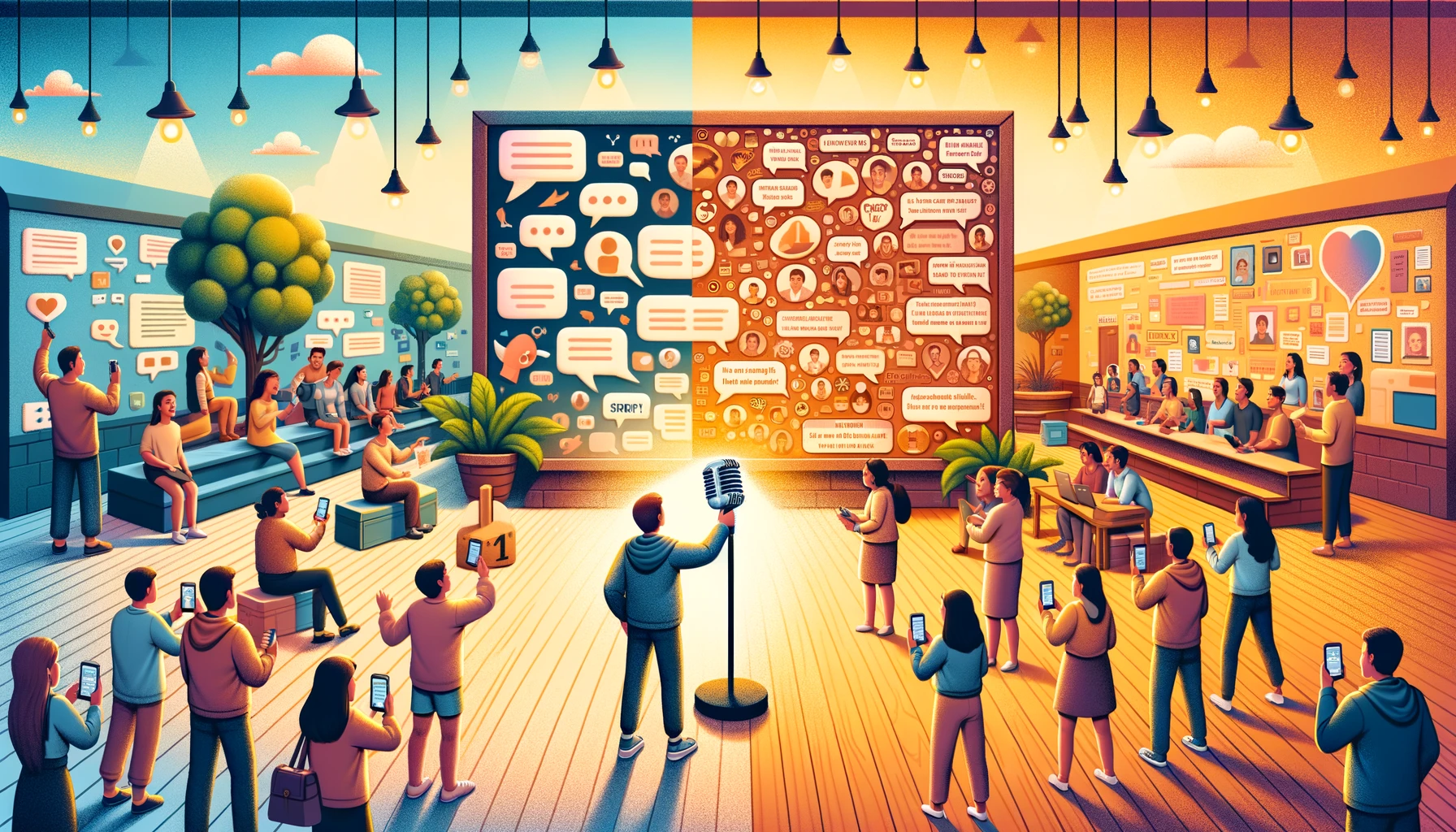
Empower Your Brand: Leveraging User-Generated Content for Drug Rehab Marketing
Table of Contents
drug rehab ugc strategies
Introduction: The Power of User-Generated Content in Drug Rehab Marketing
In the evolving landscape of drug rehab marketing, user-generated content (UGC) has emerged as a transformative tool. UGC, encompassing testimonials, reviews, social media posts, and other forms of content created by patients and their families, offers an authentic perspective that branded content often lacks. This introduction explores the significance of UGC and why it’s becoming increasingly indispensable in enhancing credibility and engagement in drug rehab marketing.
User-generated content plays a critical role by:
- Building Trust: Authentic experiences shared by real people resonate more profoundly with potential clients and their families, establishing a foundation of trust.
- Enhancing Credibility: UGC serves as social proof that the services provided are effective, thereby boosting the perceived credibility of the rehab center.
- Increasing Engagement: Stories and testimonials from actual patients encourage interaction from viewers, leading to higher engagement rates on digital platforms.
As drug rehab centers seek to connect more meaningfully with their audience, leveraging UGC can provide a significant advantage. Here’s how:
- Authenticity: In an industry where trust is paramount, content generated by those who have experienced the services firsthand speaks volumes over traditional marketing copy.
- Peer Influence: Potential clients are more likely to be influenced by peers who have faced similar challenges than by direct marketing alone.
- SEO Benefits: Fresh, unique content provided by users can help improve search engine rankings by keeping the website content dynamic and relevant.
To effectively utilize UGC, it is crucial to consider not just the collection of this content but also its strategic implementation across marketing channels. This involves curating testimonials, managing social media interactions, and incorporating user stories in a respectful and compliant manner, aligning with healthcare marketing regulations.
What is User-Generated Content in Drug Rehab Marketing?
User-Generated Content (UGC) is any form of content—text, videos, images, reviews, etc.—created by people, rather than brands. In the context of drug rehab centers, UGC can be incredibly powerful, comprising patient testimonials, stories, and social media posts. These pieces of content are not just reflections of personal experiences but are also crucial tools for enhancing the credibility and engagement of a rehab center.
Types of User-Generated Content Relevant to Drug Rehab Centers
- Patient Testimonials: Personal stories and accounts of recovery that can inspire others facing similar challenges.
- Social Media Posts: Updates, stories, and comments made by former and current patients on platforms like Facebook and Instagram.
- Video Diaries and Documentaries: Visual content created by patients documenting their recovery journeys.
- Online Reviews and Ratings: Feedback and ratings on healthcare directories, Google, and social media pages.
Examples of Effective User-Generated Content in Healthcare
- Video Testimonials: Patients speak about their recovery journey, providing a raw and real perspective that can emotionally engage prospective patients.
- Recovery Blogs: Written by patients, these offer insights and ongoing updates about the challenges and successes of living sober.
- Before and After Photos: Visual proof of recovery, showing the physical changes and improvements through the treatment process.
Utilizing UGC effectively allows rehab centers to build a community around their service, enhancing trust and supporting marketing claims with real-life evidence. It humanizes the brand and makes the services more relatable and reachable to potential clients. Moreover, such content often carries more weight and trustworthiness than professionally crafted marketing materials because it is perceived as more authentic and unbiased.

The Power of UGC in Building Credibility and Trust
User-generated content (UGC) is not just a marketing tool; it's a pivotal asset in building credibility and trust within the drug rehab community. By showcasing real experiences from past and current patients, UGC provides prospective patients and their families with relatable and convincing evidence of the efficacy of treatment programs. This chapter examines the significant impact of UGC on enhancing trust and driving patient engagement and admissions.
Statistical Insights on Consumer Trust in UGC
- Higher Trust Levels: Studies indicate that approximately 92% of consumers trust organic, user-generated content more than they trust traditional advertising.
- Influence on Decisions: Over 78% of people say that UGC highly influences their decisions, especially in healthcare, where personal testimonials can dramatically sway treatment choices.
Case Studies Showing the Impact of UGC
- Case Study 1: Engagement Boost
- Background: A mid-sized rehab center began encouraging patients to share their recovery stories on social media.
- Outcome: Engagement rates on the platform saw a 60% increase, and website inquiries rose by 30%, demonstrating a direct correlation between authentic patient stories and increased interest in the center’s programs.
- Case Study 2: Enhanced Admissions
- Background: A rehab facility implemented a video testimonial series on their website, featuring diverse recovery journeys.
- Outcome: The facility noted a 45% increase in admissions over six months post-launch, attributing this growth to the persuasive power of relatable patient experiences.
These case studies underline the effectiveness of UGC in fostering an environment of trust and authenticity. By presenting true stories and testimonials, rehab centers can transparently communicate the success of their programs, making the decision process for new patients more informed and reassuring.

Strategies to Encourage and Collect User-Generated Content
Creating an environment that encourages the sharing of personal experiences and utilizing the right tools and platforms for managing user-generated content (UGC) are key strategies for drug rehab centers. This chapter outlines effective approaches to foster user engagement and efficiently collect and manage their contributions.
Tips for Creating a Comfortable Environment for Sharing Experiences
- Open Communication Channels: Establish multiple channels where patients and their families can comfortably share their stories. This might include dedicated social media groups, feedback forms on your website, or secure forums.
- Positive Reinforcement: Actively respond to all UGC in a supportive and thankful manner to encourage continued engagement and contribution from the community.
- Privacy Assurance: Clearly communicate how personal information and stories will be used and ensure confidentiality to build trust with your contributors.
- Incentivize Contributions: Consider offering small incentives like discounts on services, branded merchandise, or entries into contests for those who share their stories.
Tools and Platforms for Collecting and Managing UGC
- Social Media Platforms: Utilize Facebook, Instagram, and Twitter where users can post their content directly. These platforms also offer tools for moderating and responding to UGC.
- Content Management Systems (CMS): Implement CMS tools that allow for the aggregation and display of UGC, such as testimonials and reviews, on your website.
- Email Campaigns: Send out requests for stories via email, providing direct links to submission forms hosted on your website.
- Digital Feedback Tools: Tools like SurveyMonkey or Google Forms can be used to collect user experiences and feedback systematically.
Leveraging these strategies helps rehab centers not only to gather valuable content from their audiences but also to enhance engagement and trust, which are crucial for successful marketing efforts. By ensuring a respectful and appreciative approach to user contributions, centers can build a rich repository of authentic stories that resonate with potential patients and their families.

Best Practices for Using UGC in Drug Rehab Marketing
Incorporating user-generated content (UGC) effectively into marketing strategies is crucial for drug rehab centers. This chapter will outline the best ways to integrate UGC into digital marketing channels and provide key do's and don'ts for showcasing patient stories and testimonials.
Integrating UGC into Digital Marketing Channels
- Website Integration:
- Feature patient testimonials prominently on your homepage to provide immediate social proof.
- Create a dedicated section for recovery stories to give a voice to those who have benefited from your services.
- Social Media Utilization:
- Share user-generated videos and posts on platforms like Facebook and Instagram to enhance relatability and reach.
- Use UGC in social media ads to increase authenticity, which can improve click-through rates and engagement.
- Email Marketing:
- Include patient stories in newsletters to keep your community engaged and informed about real-life success stories.
- Send personalized follow-up emails to patients asking them to share their experiences, thereby continually refreshing your pool of UGC.
Do's and Don'ts of Showcasing Patient Stories and Testimonials
Do’s:
- Ensure Authenticity: Always use real stories from genuine patients, and never alter their message.
- Obtain Consent: Secure permission from patients to use their stories and images in your marketing materials.
- Highlight Diverse Experiences: Show a range of recovery stories to illustrate that recovery is possible for everyone, regardless of their background.
Don’ts:
- Don’t Over-Promise: Avoid using testimonials that may imply guaranteed outcomes, which can set unrealistic expectations.
- Don’t Use Identifiable Information: Unless explicitly permitted, do not use information that could reveal the identity of a patient without their consent.
- Don’t Ignore Negative Feedback: Use less positive experiences constructively to show commitment to improvement and transparency.
By following these guidelines, drug rehab centers can use UGC to not only attract new patients but also to build a supportive community. Effective use of UGC demonstrates the center’s commitment to its patients’ success and helps establish trust with potential clients looking for genuine and effective treatment options.

Legal and Ethical Considerations in Using User-Generated Content for Drug Rehab Marketing
Incorporating user-generated content (UGC) into drug rehab marketing not only enhances engagement but also requires careful adherence to legal and ethical standards. This chapter outlines crucial guidelines for maintaining privacy and obtaining proper consent, as well as the implications of HIPAA in handling patient-generated content.
Guidelines for Maintaining Privacy and Obtaining Consent
- Obtaining Consent:
- Always obtain written consent from patients before using their stories or images in your marketing materials. This consent should specify how the content will be used and where it will appear.
- Provide patients with the option to withdraw their consent at any time, which should be a straightforward and respected process.
- Maintaining Privacy:
- Do not disclose any personal health information without explicit consent, adhering to privacy laws and best practices.
- Anonymize patient details in stories or testimonials unless full consent has been given to use their real names and identifiable details.
HIPAA Implications in Handling UGC
- Understanding HIPAA Compliance:
- The Health Insurance Portability and Accountability Act (HIPAA) sets the standard for protecting sensitive patient data. Any UGC that involves patient health information must comply with HIPAA regulations.
- Ensure that any patient information shared through UGC is secure and that your practices do not inadvertently expose protected health information (PHI).
- Training and Policies:
- Regularly train your marketing and social media teams on HIPAA compliance and the importance of protecting patient privacy.
- Develop clear policies on how to handle UGC, including steps to take if PHI is accidentally disclosed.
Navigating these legal and ethical considerations is crucial for leveraging UGC effectively while upholding the trust and safety of your patients. By ensuring that these practices are followed, drug rehab centers can use UGC to greatly enhance their credibility and engagement without compromising on compliance or ethics.
Conclusion: Harnessing User-Generated Content to Empower Drug Rehab Marketing
As we conclude this discussion on leveraging user-generated content (UGC) in drug rehab marketing, it's clear that UGC is not just beneficial but essential in today's digital marketing landscape. By incorporating real stories and testimonials into your marketing strategy, drug rehab centers can significantly enhance their credibility, engage more deeply with their audience, and ultimately drive better outcomes in both treatment success and business growth.
Recap of the Benefits of UGC
- Builds Trust and Credibility: Real patient stories are more relatable and trustworthy, helping potential clients feel more secure in their choice of treatment center.
- Enhances Engagement: UGC fosters a sense of community and belonging, encouraging interaction and engagement across digital platforms.
- Boosts SEO and Online Visibility: Fresh, authentic content can improve search engine rankings, drawing more traffic to your site and increasing online visibility.
Strategic Importance of UGC in Marketing
- Competitive Advantage: Facilities that effectively use UGC can differentiate themselves from competitors by showcasing the success and satisfaction of their patients.
- Feedback Mechanism: UGC provides valuable insights into patient satisfaction and treatment efficacy, guiding continuous improvement in services.
- Cost-Effective Marketing: Utilizing content created by users can reduce marketing costs while increasing the effectiveness of the campaigns.
Encouragement to Leverage UGC
Drug rehab centers are encouraged to harness the power of user-generated content to transform their marketing strategies. Integrating UGC not only enriches the quality of your marketing outputs but also strengthens the relationships with your clients and their families, creating a network of advocates and a repository of success stories that inspire and attract new clients.
Questions You Might Ponder
What makes UGC so effective in drug rehab marketing?
UGC is highly effective in drug rehab marketing because it offers authenticity and personal proof of success, which can significantly influence potential clients' decisions. Real stories resonate deeply, building trust and credibility more effectively than traditional advertising.
How can drug rehab centers ethically manage UGC?
Rehab centers must ensure all UGC is used ethically by obtaining explicit consent from the content creators, respecting their privacy, and never altering their messages. They should also ensure that all shared content complies with HIPAA regulations regarding patient information.
What are the best platforms for collecting UGC in drug rehab?
The best platforms for collecting UGC include social media sites like Facebook and Instagram, where people naturally share updates and stories. Dedicated sections on official websites and digital feedback tools like SurveyMonkey also facilitate UGC collection.
How does UGC influence SEO for drug rehab centers?
UGC helps improve SEO by generating fresh, unique content that search engines favor, thus improving a site’s rankings. It increases the website's visibility and attracts more traffic by keeping the content relevant and updated.
What are the potential risks of using UGC in drug rehab marketing?
Potential risks include the possible sharing of sensitive or private information, misrepresentation of treatment effectiveness, and non-compliance with legal standards like HIPAA. Managing these risks requires strict guidelines and careful content moderation.
Could we do more with the stories our community shares? Let's expand our UGC initiatives to deepen connections and drive our mission forward.